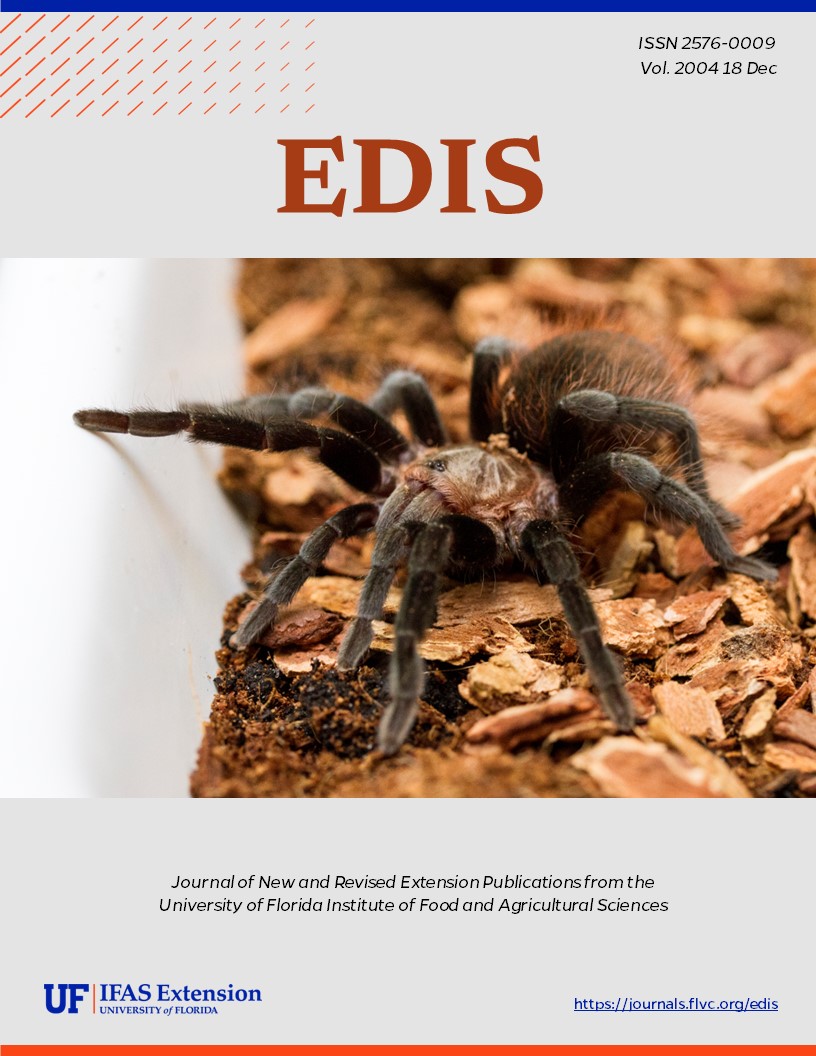Abstract
The pepper weevil, Anthonomus eugenii Cano, is the most important insect pest of pepper in the southern United States. This document is EENY-278, one of a series of Featured Creatures from the Entomology and Nematology Department, Florida Cooperative Extension Service, Institute of Food and Agricultural Sciences, University of Florida. Published: November 2002.
References
Berdegue M, Harris MK, Riley DW, Villalon B. 1994. Host plant resistance on pepper to the pepper weevil, Anthonomus eugenii Cano. Southwestern Entomologist 19:265-271.
Cartwright B, Teague TG, Chandler LD, Edelson JV, Bentsen G. 1990. An action threshold for management of the pepper weevil (Coleoptera: Curculionidae) on bell peppers. Journal of Economic Entomology 83:2003-2007. https://doi.org/10.1093/jee/83.5.2003
Eller FJ, Bartelt RJ, Shasha BS, Schuster DJ, Riley DG, Stansly PA, Mueller TF, Shuler KD, Johnson B, Davis JH, Sutherland CA. 1994. Aggregation pheromone for the pepper weevil, Anthonomus eugenii Cano (Coleoptera: Curculionidae): identification and field activity. Journal of Chemical Ecology 20:1537-1555. https://doi.org/10.1007/BF02059879
Elmore JC, Davis AC, Campbell RE. 1934. The pepper weevil. U.S. Department of Agriculture Technical Bulletin 447. 25 pp.
Goff CC, Wilson JW. 1937. The pepper weevil. Florida Agricultural Experiment Station Bulletin 310. 12 pp.
Gordon R, Armstrong AM. 1990. Biologia del picudo del pimiento, Anthonomus eugenii, Cano (Coleoptera: Curculionidae), en Puerto Rico. Journal of Agriculture, University of Puerto Rico 74:69-73. https://doi.org/10.46429/jaupr.v74i1.6530
Patrock RJ, Schuster DJ. 1992. Feeding, oviposition and development of the pepper weevil, (Anthonomus eugenii Cano), on selected species of Solanaceae. Tropical Pest Management 38:65-69. https://doi.org/10.1080/09670879209371648
Riley DG, Schuster DJ, Barfield CS. 1992a. Sampling and dispersion of pepper weevil (Coleoptera: Curculionidae) adults. Environmental Entomology 21:1013-1021. https://doi.org/10.1093/ee/21.5.1013
Riley DG, Schuster DJ, Barfield CS. 1992b. Refined action threshold for pepper weevil adults (Coleoptera: Curculionidae) in bell peppers. Journal of Economic Entomology 85:1919-1925. https://doi.org/10.1093/jee/85.5.1919
Riley DG, Schuster DJ. 1992. The occurrence of Catolaccus hunteri, a parasitoid of Anthonomus eugenii, in insecticide treated bell pepper. Southwestern Entomologist 17:71-72.
Riley DG, Schuster DJ. 1994. Pepper weevil adult response to colored sticky traps in pepper fields. Southwestern Entomologist 19:93-107.
Segarra-Carmona, A.E. and A. Pantoja. 1988a. Evaluation of relative sampling methods for population estimation of the pepper weevil, Anthonomus eugenii Cano (Coleoptera: Curculionidae). Journal of Agriculture, University of Puerto Rico 72:387-393. https://doi.org/10.46429/jaupr.v72i3.6867
Segarra-Carmona AE, Pantoja A. 1988b. Sequential sampling plan, yield loss components and economic thresholds for the pepper weevil, Anthonomus eugenii Cano (Coleoptera: Curculionidae). Journal of Agriculture, University of Puerto Rico 72:375-385. https://doi.org/10.46429/jaupr.v72i3.6866
Toapanta MA. 2001. Population ecology, life history, and biological control of the pepper weevil, Anthonomus eugenii Cano (Coleoptera: Curculionidae) Unpublished Ph.D. dissertation, University of Florida, Gainesville. 152 pp.
Unless otherwise specified, articles published in the EDIS journal after January 1, 2024 are licensed under a Creative Commons Attribution-NonCommercial-NoDerivs 4.0 International (CC BY-NC-ND 4.0) license.

